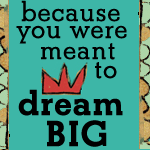Creativity expert Sir Ken Robinson always has something thought-provoking to say, and this excerpt from a talk at the Royal Society of Arts (RSA) is no exception. Love the way Cognitive Media have made this talk visual too.
What do you think? How would you change education to get more children to use all parts of their brain, and develop what they are truly good at and have a passion for, so that when it comes to working they can do what they love?
***
The Great Big Stitched Postcard Swap is open for sign-ups now! It's free - join in the fun, get some stitched gorgeousness land on your doorstep, and maybe even win something in the special giveaway! See here for more info
Saturday, 23 October 2010
Subscribe to:
Post Comments (Atom)






















Interesting topic Beth. The creaters of this video have got it right. They are using two senses working together to help you comprehend the subject being taught.
ReplyDeleteWhat educators don't always understand is that kids learn differently. Some are audial some are visual and some are tactile.
My oldest son had a teacher that was pushing to diagnose him as ADD as he appeared to be inattentive. Luckily he had a principal that understood that he was not a visual learner he was audial.
My oldest currently has an English teacher that has replaced the chairs in her class with balance balls. She has found that it helps them concentrate better if their pre-teen bodies have something to do while they are learning. Brilliant!
The one thing I found extremely facinating is the instances of the ADHD diagnosis. I had no idea that the diagnoses increase as you move east across the country.
I could go on an on about this subject as it hits home.
What a stimulating topic to wake up to this morning.
Thank you Beth, this is such a great subject to discuss and i attended a 10 hour (yes i know hows that for concentration!) lecture last Sunday and this was one of the topics... im still digesting that day a week later and will post some thoughts soon. :-)
ReplyDeleteNelly i love the balance ball idea you mention above... Making kids sit still at school and "learn" feels like it is so against their natural way. I too find ADHD an interesting topic and something that seems to be growing in diagnosis...of course i am no expert and do not have children, but I do believe food, learning preferences (and the constant distractions kids have these days) also has a lot to do with it. The answer seems to be drugs, which worries me so much (the whole "take a pill to solve it" system does generally!). Nelly thank goodness for the intuitive principle at your school. We need many more of those.
Finally our world is starting to "wake up" and spreading the word through these kinds of videos really helps get the conversation going. (thank you Beth)
In answer to your question: My thoughts are that more creative, problem solving 'project based work' needs to be prevalent in education, and more physical exercise to fuel the body that pumps blood into the sponges of brains our little people have at that age and to let their energy flow. We are all individuals and helping our children grow to celebrate that is a must. Passing exams to determine how clever can also be seen as how much you can remember! (this is the only reason i passed science at school!) lol i was also a child who was constantly being sent out of class as i was "disruptive".
Even in adulthood (especially in NYC) i see carbon copies of who we "should be", the job, money, treadmill, etc. Individualism and creative thinking is what makes us unique amazing beings. This is how the next generation can be brought up to be outstanding.
Thank you so much for posting this. xxx
Hi Beth, Love the video, totally wish I could draw like that as I gave my lectures...ha! I have been teaching high school in Los Angeles for 15 years now...a long time. I started when the "trend" was using methods of teaching that attracted and attended to the various learning styles and personalities. We did encourage students to think outside of the box. We also altered our assessment of the students so that tests alone did not determine the grade in the classroom. In our (the teachers) own college training, this was the main focus of our learning and in those first years of teaching this was one piece of how we were evaluated as teachers.
ReplyDeleteToday this is a whole different story. Now I am beginning to be evaluated on how well my students do on standardized tests. As this happens, I am being encouraged in a round-about way to teach to a test. Here is a great example of this happening...at our most recent faculty meeting (which is a similar meeting to what happens across our country) we sat with our most recent students' test scores in front of us and discussed them, compared them, and "challenged" ourselves to figure out how to raise them.
The problem to me is that teachers really cannot break out of this box (at least not easily) even if we disagree with teaching to tests when our own personal evaluations are beginning to be based on those exact scores. Principals cannot encourage teachers to break out of the box as they are being evaluated on how well their teachers are teaching to that test...this cycle continues on up. I believe it is our natural instinct of survival in our workplace that is making teachers everywhere figure out how to work out a way to get students to test better. For me this means taking away that music lesson and maybe some of that group solving that I used to do in order to put in more time on how to do well on tests.
In California there is an extra twist to this. (this varies from state to state) Students are actually not evaluated at all using our standardized state test. Only the teachers and the school. The students are encouraged to perform for us...that score has nothing at all to do with their grades or their future college acceptance. The idea is that we are proving that our schools are achieving, but the result has become an objective of being a school that "can prove" that they are achieving. The only way to do that is to use our students as the game pieces to prove ourselves as achieving schools.
Of course I could go on and on and on about this topic. One of my Mondo Beyondo dreams includes having this discussion with a policy maker in my lifetime. I find that mostly those discussions are happening with people who are not in the classrooms teaching, they are the administrators or those that are studying education without actually being in it for any length of time.
Thanks for a great thought-provoking post today!
Lorrie
Lorrie, it must be so challenging and frustrating as a great teacher such as yourself. I cant wait to hear about the meeting you will have with that policy maker. (you know it will happen) :-) You are making a difference. xx
ReplyDeleteI second Lorrie on education in California! I recently saw the documentary "Waiting for Superman" which touches upon the myriad problems in education in the US today and it does not paint a positive picture.
ReplyDeleteI can see from the documentary and Lorrie's comment that teachers have their hands tied by those who are NOT WORKING IN THE FIELD DIRECTLY. I was left with the feeling that the biggest challenges to great education today is FEAR and RESISTANCE TO CHANGE, especially in the adult ADMINISTRATORS =-(
There is so much I could say about the documentary, but I hope that many people see it and help to make the changes needed in the minds of the adults who are preventing the children from getting the best education they deserve. Art and Creativity are definitely needed to solve this problem!
This should be a must see for everyone: teachers, students, parents, politicians... I am going to share it like there is no tomorrow!
ReplyDeleteThank you so much for bringing this up!
Such thought-provoking responses, thanks everyone. Fascinating to hear the inside view of education from over there in California. I am going to ponder some more and return to this topic as it is really important and there is so much more to say
ReplyDeleteBeth
This hits so close to my heart as I always felt like one of those kids who wasn't smart but in reality was a visual learner. I have been so aware of learning differences in kids and have tried to teach my children in the ways that they learn and comprehend things, while exposing them to many different types of people and situations. Another wonderful point made in this video is that group learning and having peers in multiple age groups is a wonderful way to share interests and bring people together based on like interests and learning styles. It blows my mind to think of what can be accomplishment in these types of learning environments! As mentioned by others here, I could go on and on about this subject. I have such an interest in education and how children learn differently and the ways we can change the current system to discourage conforming and encourage individuality and creative thinking. Looking forward to more on the topic! Thanks Beth :) ....and Hi Lori and Louise!
ReplyDelete